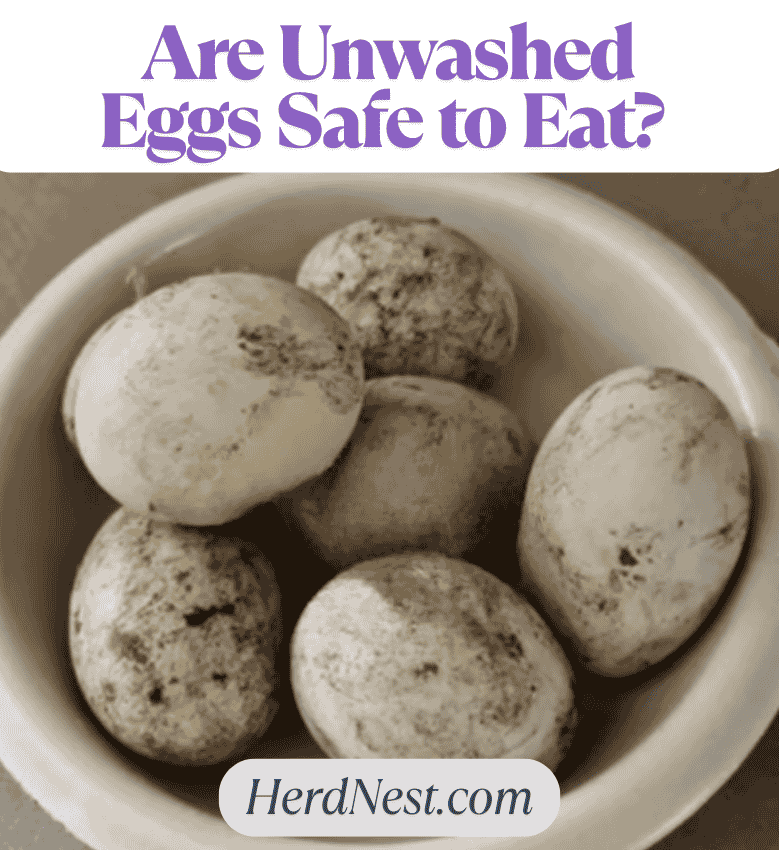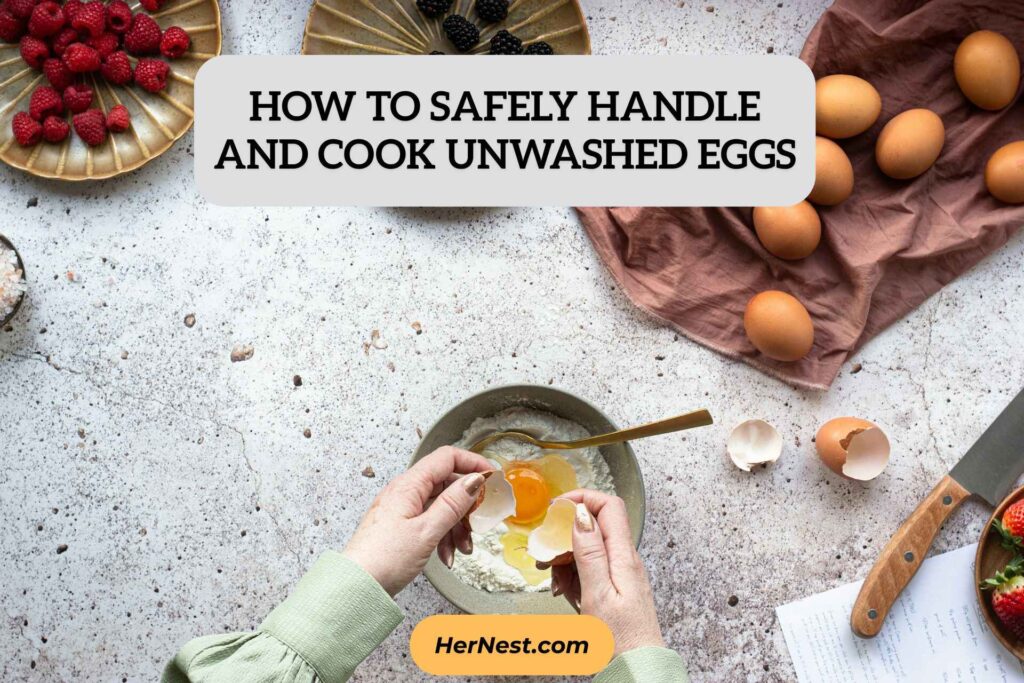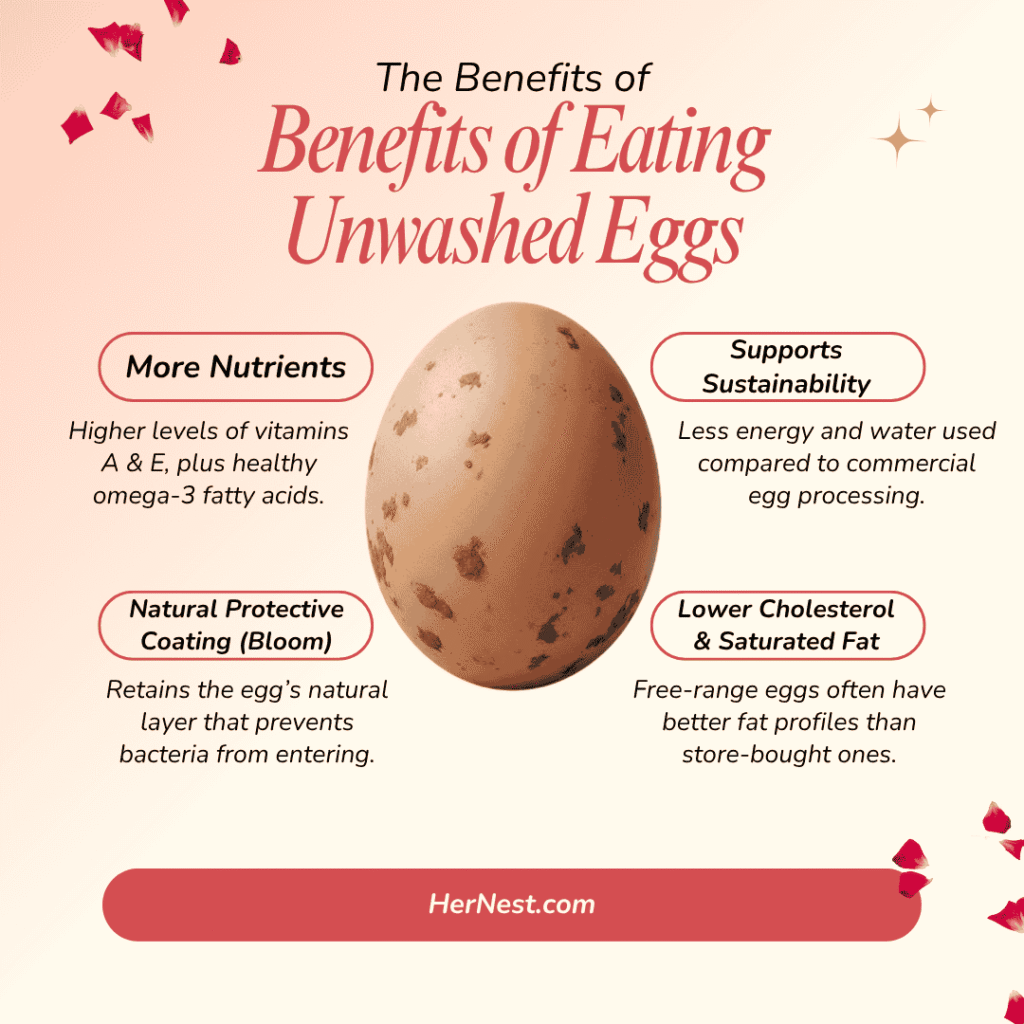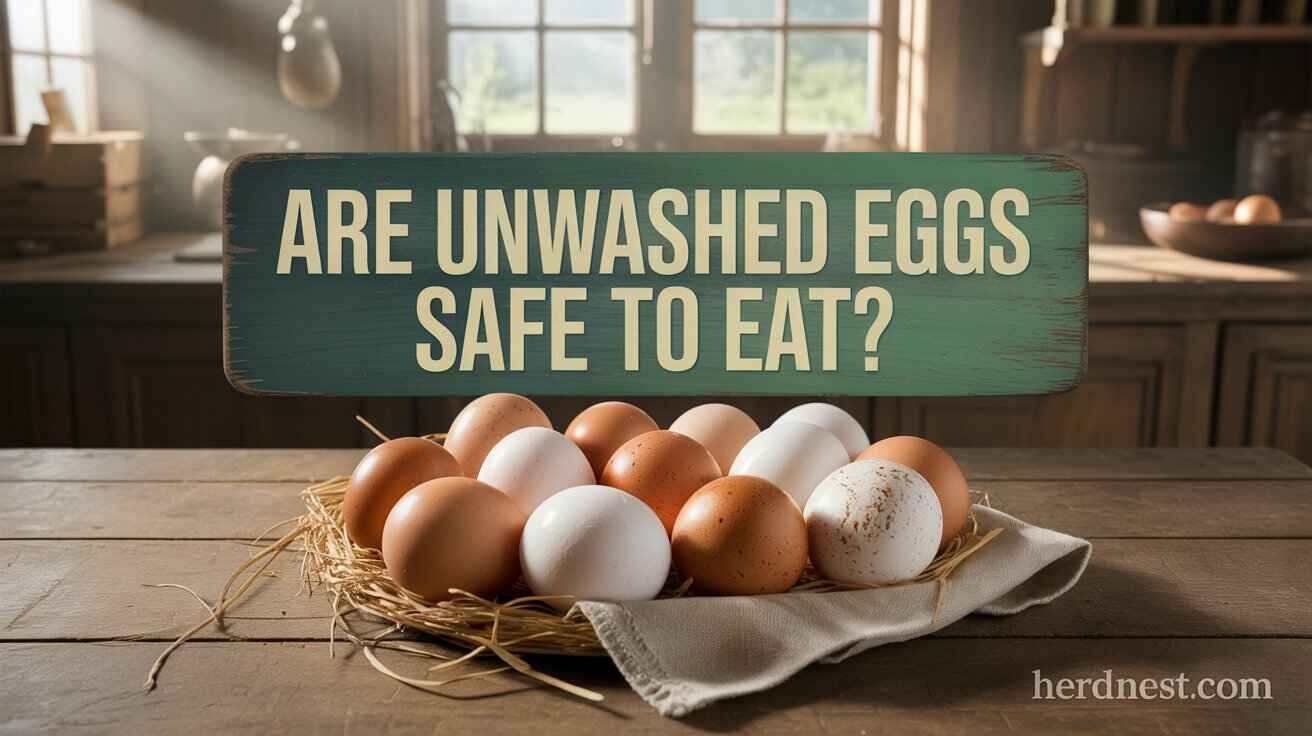Many people enjoy eggs as a breakfast staple, but not everyone thinks about their safety before eating them. In my experience, farm-fresh eggs feel like a powerhouse of nutrition, especially because they are protein-packed and incredibly versatile in different dishes.
However, dealing with unwashed eggs requires some precautions to ensure they remain edible. Unlike store-bought ones, these eggs still have their protective shell coating, which prevents bacteria from entering.
This natural barrier raises questions about egg-washing and whether it affects quality. Some believe washing removes this defense, while others argue it’s necessary for safe consumption.
As someone who has explored various practices in food safety, I often delve into the details of how to properly consume eggs without risking contamination. This article highlights why understanding the right handling methods is essential for your everyday food choices.

Table of Contents
ToggleAre Unwashed Eggs Safe to Eat?
Unwashed eggs, especially from backyard farms, retain a natural protective layer called the bloom, which helps block bacteria. While they can carry surface contaminants like Salmonella, E.coli, or Campylobacter, proper handling like refrigeration, checking for cracks, and thorough cooking greatly reduces risks.
Unlike store-bought eggs, which are washed and lose their bloom, unwashed eggs may stay fresher longer if stored correctly. Many prefer them for their richer flavor, better nutrient retention, and sustainable sourcing. Whether washed or unwashed, safety depends on clean handling and proper preparation.
Hidden Bacteria on Unwashed Eggs
Eggshells can carry bacterial risks if not handled properly. From my experience raising homegrown chickens, I’ve noticed how chicken farmers often debate whether egg washing is necessary.
While commercial facilities clean eggs for safety, some argue that washing removes their natural barrier, increasing the risk of contamination. Harmful bacteria like Salmonella, E.coli, and Campylobacter can cling to the surface, especially in a dirty environment where feces and dirt accumulate.
When foraging, chickens expose their eggs to contaminants, raising the chance of penetration through the porous shell. Some experts warn that improper handling encourages growth, making it riskier to consume freshly laid eggs.
I always prioritize freshness and proper storage when making delicious breakfasts, knowing that production methods and improperly cleaned eggs affect food safety.

Unwashed vs. Store-Bought Eggs
In the United States, eggs in the store go through washing before landing on shelves, unlike free-range eggs from backyard farms. These unwashed eggs often come from organic setups where hens have more space to forage, reducing the risk of contamination.
A key difference is that egg-laying chickens in commercial farms lose their natural protective layer, called the bloom or cuticle, during washing. This barrier helps prevent bacteria from entering the eggs, which is why some argue that removing it increases risks.
However, unwashed eggs may still carry dirt and fecal matter, making proper handling, refrigeration, and cooking crucial for food safety. While I’ve raised hens and enjoyed the rich nourishment of home-collected eggs, I always follow safe practices to avoid issues when consuming them.
Understanding these differences helps ensure both freshness and safety when choosing between store-bought and farm-fresh eggs.
Risks of Eating Unwashed Eggs
Eating unwashed eggs comes with a risk of contamination, as bacteria like Salmonella and Campylobacter can be present on the eggshell. Since hens lay eggs in a natural environment, contact with fecal matter or other contaminated materials can make them unsafe.
Some people believe washing eggs immediately after being laid improves safety, but it can actually force pathogens through the porous shell, increasing the chance of infection.
Proper selection, storage, and preparation play a crucial role in ensuring that eggs remain safe for consuming. As someone who enjoys versatile food staples, I always consider the best handling methods before eating farm-fresh eggs.

How to Safely Handle and Cook Unwashed Eggs
Proper handling and storage of unwashed eggs are essential to avoid contamination and reduce health risks. I always keep my farm-fresh eggs in a cool place, ideally in a refrigerator at 40°F (or 4.4°C) to maintain their freshness.
Before cooking, it’s important to wash your hands thoroughly and ensure that any utensils or surfaces used in food preparation are cleaned with hot soapy water immediately after use. When selecting eggs, I check for cracks or damage on the shells, as this can allow microorganisms to enter, increasing the chances of Salmonella contamination.
When preparing eggs, avoid cracking them on hard surfaces to prevent shell fragments from getting into the bowl or touching other ingredients. For egg safety, it’s best to cook them properly using methods like boiling, frying, or baking to kill harmful bacteria.
If using raw eggs in recipes, I always keep them separate from other dishes and ensure they are prepared safely. Following these guidelines helps make cooking with unwashed eggs safer and prevents

Benefits of Eating Unwashed Eggs
Many people choose to consume unwashed eggs because they retain their bloom, a natural protective layer that prevents bacteria from entering.
Unlike store-bought eggs, which are often washed and lose some of their nutrients, farm-fresh eggs maintain better retention of vitamins A and E, along with fatty acids like omega-3. A study by Mother Earth News found that free-range chickens produce eggs with less cholesterol and saturated fat than conventional eggs.
The taste of fresh eggs also differs, offering a richer flavorful variation compared to commercial options. Choosing local eggs supports sustainability, reducing the need for extra energy and water used in large-scale egg production.
Many farms focus on organic methods, ensuring safe and environmental practices. By making conscious choices, consumers can enjoy eggs straight from the farm, knowing they are making a positive impact while benefiting from superior nutrition.
Conclusion
Unwashed eggs are just as nutritious and high-quality as their washed counterparts, with the key difference being the bloom, which keeps bacteria at bay. Ensuring proper storage, handling, and cooking will significantly reduce any potential bacterial contamination risks, helping to maintain the quality and safety of farm-fresh eggs. Trusting a reliable egg source allows you to enjoy these beauties with confidence!
Frequently Asked Questions:
How Do Unwashed Eggs Compare To Washed Eggs In Terms Of Nutritional Content And Quality?
There is no significant difference in the nutritional content of unwashed and washed eggs, but their handling requires extra precautions. Unwashed eggs retain their bloom, a natural protective coating that helps prevent contamination from bacteria entering through the porous shell.
This is why organic eggs are often sold without washing. However, the possibility of salmonella exposed through feces in the production process means they should still be handled carefully.
Washing eliminates some risks but can also remove this protective barrier, making proper storage essential. Whether washed or unwashed, both types should be cooked thoroughly to reduce any risk of contaminated eggs.
Can Unwashed Eggs Be Used In Recipes That Call For Raw Eggs?
Using unwashed eggs in recipes like Caesar dressing or homemade mayonnaise requires caution due to the potential risk of bacterial contamination. To minimize issues when consuming raw egg dishes, it’s essential to get them from reputable suppliers with strict hygiene practices. Before use, always wash any visibly dirty shells thoroughly to ensure safety
Do Unwashed Eggs Have A Longer Or Shorter Shelf Life Compared To Washed, Store-Bought Eggs?
Unwashed eggs often have a longer shelf life than washed store-bought eggs because of their protective bloom and cuticle layers. These natural barriers help maintain freshness and prevent spoilage if stored and handled correctly. Unlike their counterparts found in stores, they can last for weeks without refrigeration, making them valuable gems in the kitchen.




